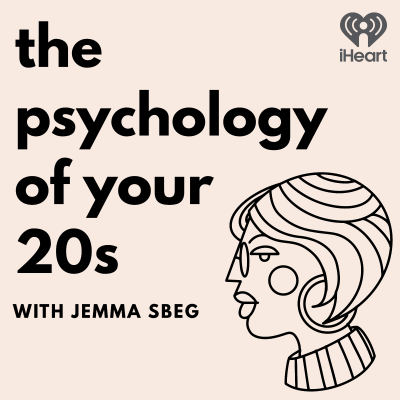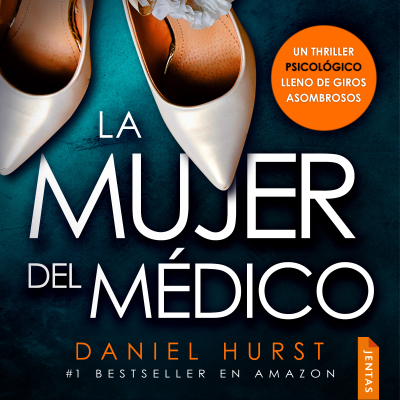
The Psychology of your 20s
inglés
Desarrollo personal & Salud
Oferta limitada
2 meses por 1 €
Después 4,99 € / mesCancela cuando quieras.
- 20 horas de audiolibros / mes
- Podcasts solo en Podimo
- Podcast gratuitos
Acerca de The Psychology of your 20s
A podcast that explains how everything is psychology. Even your 20s. Hosted by Jemma Sbeg, each Tuesday and Friday we deep dive into the science and psychology behind a topic, concept or universal experience that defines our 20s - from dating, to mental health, career anxiety, friendship, finances and all the growing pains associated with this decade. Listen now. My book is out NOW: https://www.psychologyofyour20s.com/general-clean For business enquires please email psychologyofyour20s@gmail.com
Todos los episodios
392 episodios390. The psychology of serial monogamy & relationship hopping
Why do some people seem to move from relationship to relationship with barely any time in between, and why does being single feel almost impossible for them? In this bonus episode, we’re diving into the psychology behind relationship hopping (aka serial monogamy) and what’s really happening when someone craves commitment quickly, struggles with time alone, or keeps repeating the same cycle with different partners. We explore: • The role of attachment in serial monogamy • Why artificial closeness is so appealing • The pull of the infatuation cycle • The brain chemistry of love, reward and attachment • What this pattern can teach us about self-growth Listen now! Watch on Netflix [http://netflix.com/thepsychologyofyour20s] Follow Jemma on Instagram: @jemmasbeg [https://www.instagram.com/jemmasbeg/?hl=en#] Follow the podcast on Instagram: @thatpsychologypodcast [https://www.instagram.com/thatpsychologypodcast/?hl=en#] Subscribe on Substack: @thepsychologyofyour20s [https://substack.com/@thepsychologyofyour20s] For business: psychologyofyour20s@gmail.com [psychologyofyour20s@gmail.com] The Psychology of your 20s is not a substitute for professional mental health help. If you are struggling, distressed or require personalised advice, please reach out to your doctor or a licensed psychologist. See omnystudio.com/listener [https://omnystudio.com/listener] for privacy information.
389. How to experience healthy love after toxic love
After toxic love, healthy love can feel surprisingly hard to recognise because you’ve likely learned to expect chaos, inconsistency, and emotional whiplash. In this episode, we unpack what toxic love actually looks like, how it shapes your beliefs about love in your 20s, and why calm, consistent connection can feel suspicious or even ‘boring’ when you’re used to intensity. We explore: • What toxic love is and how it intersects with abusive • How this reshapes trust, pessimism, and your expectations of people • The role of neurochemistry, addiction, and intermittent reinforcement in toxic bonds • Self-sabotage and self-esteem • The role of attachment patterns over time • What healthy love and conflict actually feel like • Practical ways to lean into safe love If you’re conflicted between craving consistency or chaos, this episode is for you. Watch on Netflix [http://netflix.com/thepsychologyofyour20s] Follow Jemma on Instagram: @jemmasbeg [https://www.instagram.com/jemmasbeg/?hl=en#] Follow the podcast on Instagram: @thatpsychologypodcast [https://www.instagram.com/thatpsychologypodcast/?hl=en#] Subscribe on Substack: @thepsychologyofyour20s [https://substack.com/@thepsychologyofyour20s] For business: psychologyofyour20s@gmail.com [psychologyofyour20s@gmail.com] The Psychology of your 20s is not a substitute for professional mental health help. If you are struggling, distressed or require personalised advice, please reach out to your doctor or a licensed psychologist. See omnystudio.com/listener [https://omnystudio.com/listener] for privacy information.
388. The psychology of fashion & personal style
Personal style might look like a surface-level thing, but it’s actually one of the most psychologically loaded choices we make every day. What we wear shapes how we’re perceived, how we feel, and sometimes even what parts of ourselves we give permission to show. In this episode, we’re unpacking the psychology of personal style - why we’re drawn to what we’re drawn to, what shapes our wardrobe, and how to find a style that actually feels like you. We explore: • How upbringing and early experiences shape what feels safe, flattering, or off-limits • The role of the Big Five personality traits • Style as identity signalling • How clothes shift out mood • The role of trends and fast fashion in conformity • How to rediscover your personal style If you’ve ever felt like your wardrobe doesn’t quite match who you are, this episode is for you. Watch on Netflix [http://netflix.com/thepsychologyofyour20s] Follow Jemma on Instagram: @jemmasbeg [https://www.instagram.com/jemmasbeg/?hl=en#] Follow the podcast on Instagram: @thatpsychologypodcast [https://www.instagram.com/thatpsychologypodcast/?hl=en#] Subscribe on Substack: @thepsychologyofyour20s [https://substack.com/@thepsychologyofyour20s] For business: psychologyofyour20s@gmail.com [psychologyofyour20s@gmail.com] The Psychology of your 20s is not a substitute for professional mental health help. If you are struggling, distressed or require personalised advice, please reach out to your doctor or a licensed psychologist. See omnystudio.com/listener [https://omnystudio.com/listener] for privacy information.
387. The truth about narcissism ...
When did ‘narcissist’ become the go-to explanation for every difficult person - and what do we lose when one word starts covering everything from basic selfishness to genuine psychological harm? In this bonus episode, we break down what psychologists actually mean by narcissism: where the term came from, what it truly means, and how the term has been adopted in our society. We explore: • Differences between Narcissistic Personality Disorder and narcissistic traits • The two main forms of narcissism • How has the term become overused? • The dangers of simplifying the term • Can narcissists ever change? Or is it all pretend? Listen now! Follow Jemma on Instagram: @jemmasbeg [https://www.instagram.com/jemmasbeg/?hl=en#] Follow the podcast on Instagram: @thatpsychologypodcast [https://www.instagram.com/thatpsychologypodcast/?hl=en#] Subscribe on Substack: @thepsychologyofyour20s [https://substack.com/@thepsychologyofyour20s] For business: psychologyofyour20s@gmail.com [psychologyofyour20s@gmail.com] The Psychology of your 20s is not a substitute for professional mental health help. If you are struggling, distressed or require personalised advice, please reach out to your doctor or a licensed psychologist. See omnystudio.com/listener [https://omnystudio.com/listener] for privacy information.
386. 26 lessons I've learnt in 26 years
It's my 26th birthday, and I'm in a reflective mood. As I pass the halfway point of my 20s (and this podcast), I'm looking back at some of the lessons I've learnt so far and what I hope I learn in the next four years. Also, the question people keep asking: will there be a Psychology of your 30s, stay tuned to the end to hear my thoughts! Watch on Netflix [http://netflix.com/thepsychologyofyour20s] Follow Jemma on Instagram: @jemmasbeg [https://www.instagram.com/jemmasbeg/?hl=en#] Follow the podcast on Instagram: @thatpsychologypodcast [https://www.instagram.com/thatpsychologypodcast/?hl=en#] Subscribe on Substack: @thepsychologyofyour20s [https://substack.com/@thepsychologyofyour20s] For business: psychologyofyour20s@gmail.com [psychologyofyour20s@gmail.com] The Psychology of your 20s is not a substitute for professional mental health help. If you are struggling, distressed or require personalised advice, please reach out to your doctor or a licensed psychologist. See omnystudio.com/listener [https://omnystudio.com/listener] for privacy information.
Elige tu suscripción
Oferta limitada
Premium
20 horas de audiolibros
Podcasts solo en Podimo
Podcast gratuitos
Cancela cuando quieras
2 meses por 1 €
Después 4,99 € / mes
Premium Plus
100 horas de audiolibros
Podcasts solo en Podimo
Podcast gratuitos
Cancela cuando quieras
Disfruta 30 días gratis
Después 9,99 € / mes
2 meses por 1 €. Después 4,99 € / mes. Cancela cuando quieras.















































